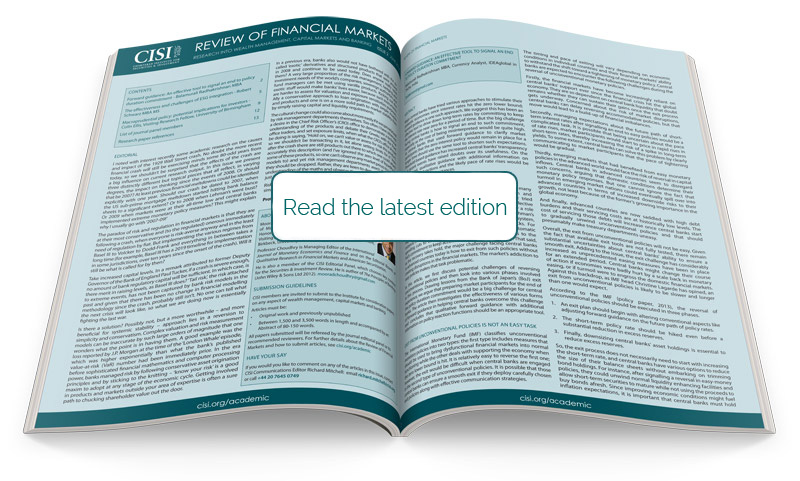The wealth of nations: building sustainable finance capacity
Introduction by George Littlejohn MCSI
Climate change and sustainability present significant financial risks to business and society, and offer opportunities to lead the transition to a sustainable, low-carbon world, and at the same time to protect our all-important natural capital – the one world we have to live on (at least for now). Governments around the world (including the UK) are reviewing their sustainable finance strategies. To support that urgent process, the Chartered Body Alliance – the CISI with our colleagues, the bankers and insurers – working with PwC has been conducting research and analysis on behalf of the Green Finance Education Charter (GFEC) bodies on the knowledge and skills requirements in this central field.
The UK government launched the GFEC in 2020, a collective initiative across UK finance professions to align professional education and training with national and global sustainability objectives. This research programme, conducted in association with the main UK government departments, has identified current gaps and future knowledge and skills needs related to sustainable finance across the financial sector. The aim is to map the landscape, drawing attention to strengths, weaknesses, and gaps, benchmarking best practice globally.
The research indicates significant gaps in skills and training provision for our sector and a particular need for formal training plans for sustainable finance, including assessments of current knowledge and skills gaps in firms and individuals. This needs a combination of effort, and more joined-up thinking, both internally in organisations and externally through professional bodies, training providers, and government departments.
That needs careful thought on bridging the gap between knowledge and skills. Take, for instance, the voluntary carbon market launched in 2022 by London Stock Exchange Group (LSEG, where life on CISI began). Companies must demonstrate credible science-based strategies to reduce the carbon footprint of their activities to address unavoidable and residual emissions on their decarbonisation journey. Many companies are buying carbon credits as interim emission reduction targets are approaching. Corporate demand for these credits is sharply on the rise.
As in any market, there is a clear requirement for scale, liquidity, and transparency. In response, LSEG has launched its voluntary carbon market. It is designed to channel finance into projects that are seeking to reduce greenhouse gases in the atmosphere, giving rise to carbon credits, provide access to carbon credits for investors and corporates, and all with the benefits of public market regulation and disclosure requirements.
How will the voluntary carbon market work? That’s where both knowledge, and skills, and the bridge linking the two, come in. The market is open to closed-ended investment funds and operating companies admitted or seeking admission to trading on the LSEG markets. A fund or a company raises capital from investors for a fund. The capital raised will be invested into a portfolio of climate change mitigation projects alongside other climate-aligned assets. Projects are managed by expert project developers and accredited by recognised industry bodies, with the objective of generating carbon credits that can be distributed to investors, retired on behalf of investors, or sold, leveraging the market infrastructure, regulation, discipline, and transparency inherent in public markets. The development of both knowledge and skills required here is becoming clear.
Sustainable finance: the world in 2023
At the CISI’s first event of 2023, Chris Hayward, policy chair of the City of London Corporation, offered a tour d’horizon of the challenges we face.
How cloudy is the fintech future?
Tim Skeet, a veteran banker in the City of London, surveys the prospects for ‘fintech’ as it shows signs of losing some its allure.
Liability-driven investment – the final roundup
Britain’s gilt market drama in september 2022 drove down the value of retirement schemes by as much as £500 billion. What lessons were learned?
Plugging the regulatory gaps to keep pensions safer in future crises
In February 2023, the House of Lords Industry and Regulators Committee criticised the use of liability-driven investment (LDI) strategies by defined benefit pension funds, raising concerns that regulators had not focused sufficiently on the risks and dangers that borrowing to boost investment returns could pose to pension scheme finances, and to wider financial stability in the event of interest rates rising.
This piece covers key findings from the committee's scrutiny.
Debating the economics of financial technology conference, 21–23 June 2023
The University of Edinburgh together with the Edinburgh Futures Institute is bringing together leading experts in the world of finance and technology to assess the next phase in the application of technology to finance.
Corporate ego: failures of corporate governance in Scotland and beyond
Sir Ewan Brown, doyen of Scottish bankers, and who has served on the boards of much of Scotland Plc, set the cat amongst the pigeons in December 2021 with his book Corporate Ego.
Read the latest edition of Review of Financial Markets

Download the Review of Financial Markets
 March 2023 edition
March 2023 edition
 August 2022 edition
August 2022 edition
 February 2022 edition
February 2022 edition
 October 2021 edition
October 2021 edition
 June 2021 edition
June 2021 edition
 February 2021 edition
February 2021 edition
 October 2020 edition
October 2020 edition
 June 2020 edition
June 2020 edition
 February 2020 edition
February 2020 edition
 October 2019 edition
October 2019 edition
 July 2019 edition
July 2019 edition
 Q1 2019 edition
Q1 2019 edition
 Q3 2018 edition
Q3 2018 edition
 Q2 2018 edition
Q2 2018 edition
 Q1 2018 edition
Q1 2018 edition
 Q4 2017 edition
Q4 2017 edition
 Q3 2017 edition
Q3 2017 edition
 Q2 2017 edition
Q2 2017 edition
 January 2017 edition
January 2017 edition
 September 2016 edition
September 2016 edition
 July 2016 edition
July 2016 edition
 March 2016 edition
March 2016 edition
 December 2015 edition
December 2015 edition
 September 2015 edition
September 2015 edition
 June 2015 edition
June 2015 edition
 March 2015 edition
March 2015 edition
 December 2014 edition
December 2014 edition
 September 2014 edition
September 2014 edition
 June 2014 edition
June 2014 edition
 March 2014 edition
March 2014 edition